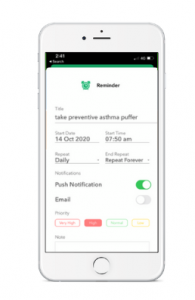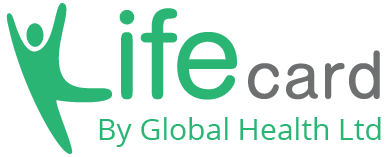According to Asthma Australia 1 in 9 people are affected by asthma, however many of those suffering asthma related symptoms do not manage their condition as well as they could.
We’ve put together 5 ways that the Lifecard app is beneficial to healthcare providers while supporting patients living with asthma.
 1 Preventative care
1 Preventative care
The healthcare eco-system is focused on treating episodes not guiding or preventing deteriorating health. In addition, siloed data means the care providers lack the “big picture”.
Lifecard gives healthcare providers a holistic view of a patients’ health data and their history, allowing them to make more informed decisions for better outcomes.
2 A single source of information
People with asthma or their carers will often see more than one health professional throughout their life journey. This can be exhausting for patients, and can require them to provide complex and traumatic information.
Lifecard gives patients and their clinician the convenience of having a combined view of their health data in the palm of their hand to avoid repeatedly relaying their story.
3 Paper-less care
Lifecard is integrated with Global Health’s ReferralNet Secure Messaging system. Therefore, users can securely receive confidential communication such as care plans, test results and other clinical documents directly into their Lifecard Personal Health Record, which is stored in machine and human-readable formats. These health documents are then easily saved in Lifecard, which can be accessed and viewed in the future by the user or their chosen healthcare professionals, for more informed decision making.
4 Better patient outcomes
Lifecard connects users with their care team and empowers them to work in tandem with their healthcare specialists to boost compliance with prescribed care plans.
5 Recording of asthma related measurements

Lifecard allows for the tracking of several asthma related data types; including patient record outcome measures that can be tracked over time. Some of the measures or outcome measures users can record data against include:
Measures:
- Peak Flow Test L/Minute
- Number of asthma spells in a week
Outcome measures and surveys:
- My chest felt tight because of asthma in the past 7 days
- I felt wheezy because of my asthma in past 7 days
- I coughed because of my asthma in past 7 days
- It was hard for me to play sports or exercise because of my asthma in past 7 days
- My asthma bothered me in past 7 days
- I got tired easily because of my asthma in past 7 days
- I had asthma attacks in past 7 days
The information captured can be used to easily inform your doctor or specialist more accurately on your current condition.
Lifecard has started work on integration with Apple Health. The first phase of this integration will see data like your Peak Flow or Forced Expiratory rate automatically added to the Lifecard app from integrated devices, such as the SmartOne App with the MIR Smart One Spirometer.
The integration will also see data such as heart rate and steps automatically added into Lifecard from Apple Health integrated devices, allowing those affected by asthma to pick up on trends around level of exercise or activity compared to how severe their asthma was on a day or in a week.


